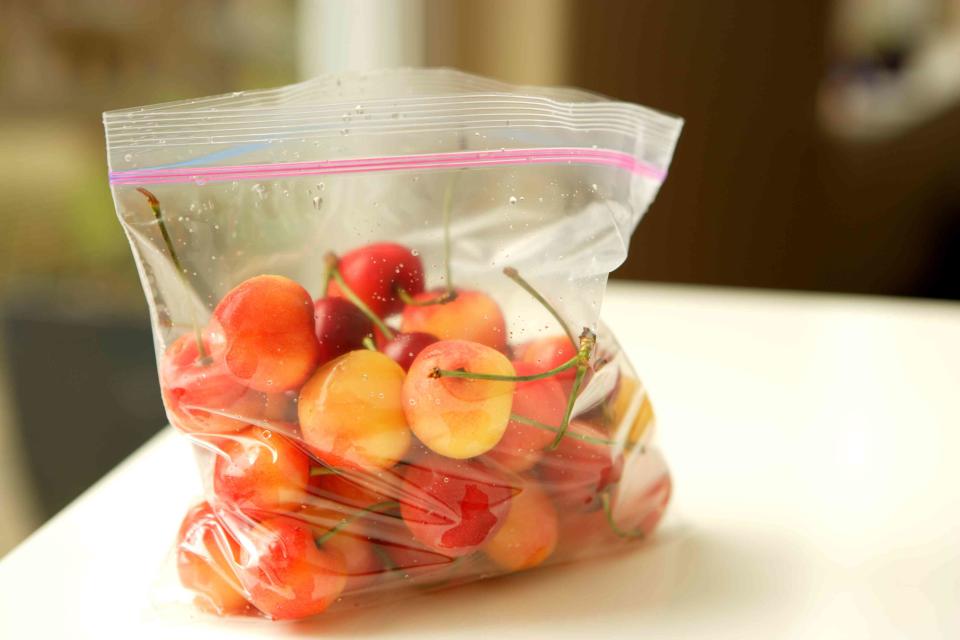Can You Reuse Your Plastic Freezer and Sandwich Bags?
Food safety experts weigh in on whether you not you can reuse your plastic resealable bags.

Lori Lee Miller / Getty Images
Whether you use them for packing snacks or storing leftovers, plastic freezer and sandwich bags are items many people keep in their kitchen. But if you want to cut back on your plastic use, you may be wondering if you can reuse this food storage staple more than once. To answer this question, we spoke to food safety experts who explain how to safely reuse resealable bags and when to throw them away.
Meet Our Expert
Carla L. Schwan, Ph.D., assistant professor and extension food safety specialist director at the National Center for Home Food Preservation
Tracey Brigman, EdD, MS, RDN, LD, clinical associate professor and associate director for the National Center for Home Food Preservation at the University of Georgia
Related: 15 Food Storage Containers That Keep Food Fresh and Organized
Can You Reuse a Plastic Freezer or Sandwich Bag?
Generally, it can be safe to reuse a plastic bag as long as it is washed properly first, says Carla L. Schwan, Ph.D., assistant professor and extension food safety specialist director at the National Center for Home Food Preservation. With that being said, whether or not it's safe to reuse a plastic bag ultimately comes down to what was in the bag and the condition it's in once you're done using it.
When to Reuse a Plastic Bag
Some foods are safer to keep in plastic resealable bags that you plan to reuse than others. "The best items to keep in a resealable bag to ensure it remains safe for reuse are dry goods such as baked products, cookie dough, grains, or nuts (as long as it is not an allergy-triggering food)," says Tracey Brigman, EdD, MS, RDN, LD, clinical associate professor and associate director for the National Center for Home Food Preservation at the University of Georgia.
Related: 6 Common Food Storage Mistakes to Avoid, According to Food Scientists
When Not to Reuse a Plastic Bag
There are some instances in which you should never reuse a plastic freezer or sandwich bag. "We do not recommend reusing any bags that have held raw meat, fish, eggs, or potentially allergy-triggering foods," says a spokesperson from Ziploc. A resealable bag that contained any of the big nine allergens, such as tree nuts, peanuts, or sesame, is not suitable for reuse as these foods may leave trace allergens and pose a risk of cross-contact, says Schwan.
You should also never reuse a plastic resealable plastic bag if it has any signs of mold or yeast growth, as you run the risk of potentially contaminating whatever is stored in the bag next. Additionally, anytime the bag is damaged, cloudy, or dirty, it should not be reused, says Brigman.
How Many Times Can You Reuse a Plastic Bag?
How often you reuse a plastic bag depends on a few factors, such as the material of the bag, how it is cleaned (and how well), and what was stored in the bag previously, says Schwan. "Different bags and materials may withstand more washes than others. It is always a good idea to inspect the bag for any signs of wear or damage after each use and discard if necessary," she says.
Related: 11 Food Storage Containers That Will Help You Achieve an Organized, Streamlined Refrigerator
How to Wash a Plastic Freezer or Sandwich Bag
Before reusing a plastic bag, you must wash it first, no matter what was stored inside. "The best way to clean a resealable bag for reuse is to wash it with soap and water. "Do not turn the bag inside out when washing, as that can result in stress or tears in the bag," says Brigman. Make sure you scrub the seams of the bag thoroughly since food can get stuck in the seal. After cleaning, rinse the bag well and wait until it's completely dry to reuse it.
Read the original article on Martha Stewart.

